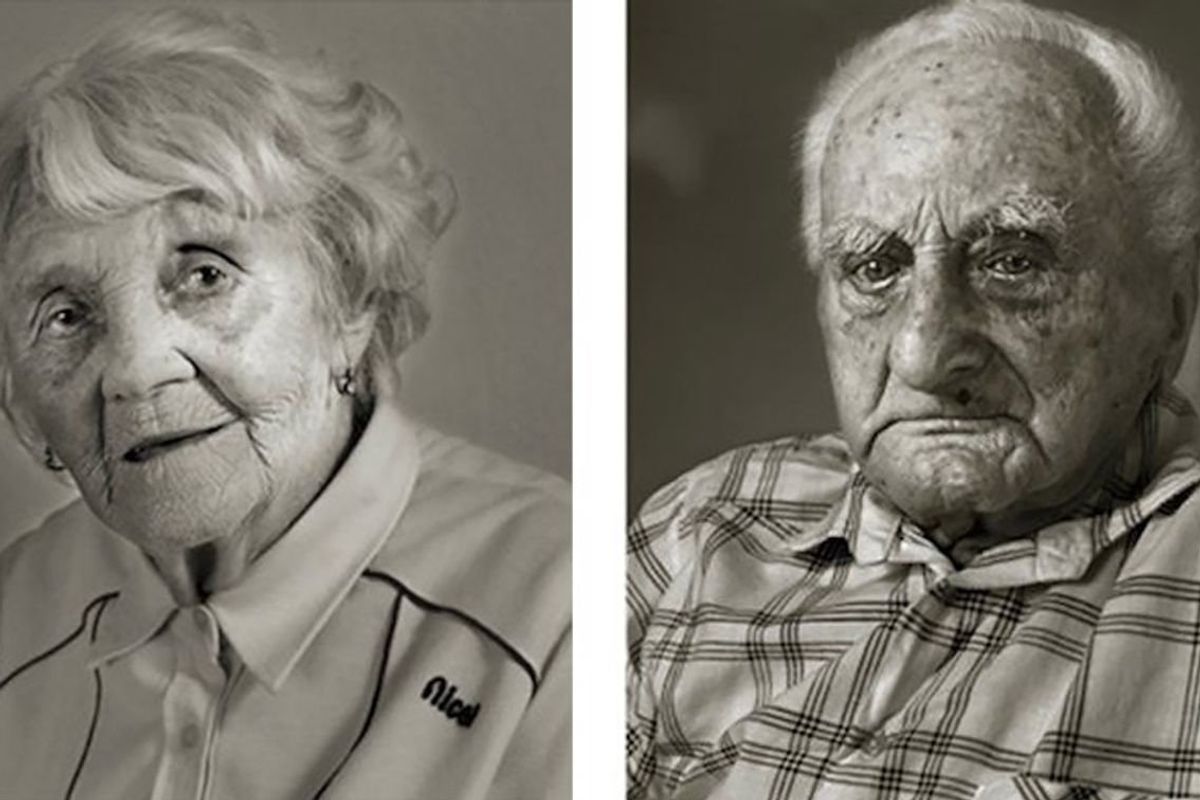12 unforgettable side-by-side photos of people over 100-years-old with their younger selves
A truly beautiful reminder of how delightful aging can be.
Jan Langer's incredible photos are timeless.
Czech photographer Jan Langer's portrait series "Faces of Century" shows them in a different light: as human beings aged by years of experience, but at their deepest level, unchanged by the passing of time. In the series, Langer juxtaposes his portraits with another portrait of the subject from decades earlier. He recreates the original pose and lighting as closely as he can — he wants us to see them not just as they are now, but how they have and haven't changed over time. That is the key to the series.
These are the rare faces of people who have lived through two world wars, a cavalcade of regimes, and the rush of advancements in modern life. These photos, and the stories of the lives lived by the people in them, show not only the beauty of aging, but how even as we age, we still remain essentially ourselves.
All photos by Jan Langer.
1. Prokop Vejdělek, at age 22 and 101

Vejdělek is a former metallurgical engineer who will never forget the taste of warm fresh goat's milk.
2. Bedřiška Köhlerová, at age 26 and 103
Originally born in Merano, Italy, Köhlerová wishes to visit Italy one more time.
3. Ludvík Chybík, at age 20 and 102
Chybík is a former postal carrier and says he will never forget the route he worked every day.
4. Vincenc Jetelina, at age 30 and 105
Jetelina spent eight years in prison after World War II. Now, he just wants to live the rest of his life in peace.
5. Antonín Kovář, at age 25 and 102
Kovář is a former musician whose daughter comes to visit him every day. He wishes to play the clarinet once more.
6. Anna Vašinová, at age 22 and 102
Vašinová will always remember the day her husband was taken away by the Nazis. She wishes to be reunited with him after death.
7. Stanislav Spáčil, at age 17 and 102
Spáčil was an electrical engineer throughout his life and thinks that it's too early in his life to think about the past.
8. Anna Pochobradská, at age 30 and 100
Pochobradská was a farmer. She now lives a quiet life and is thankful that her daughter visits her every weekend.
9. Antonín Baldrman, at age 17 and 101
Baldrman was a clerk early in life and keeps up with current events by reading the newspaper.
10. Marie Burešová, at age 23 and 101
Burešová loves talking to her family and wishes to have them all together again.
11. Vlasta Čížková, at age 23 and 101
Čížková cooked in the dining room at the airport in the small village of Vodochody. She'll never forget reciting her own poetry at wedding ceremonies.
12. Ludmila Vysloužilová, at age 23 and 101
Vysloužilová stays active every day by chopping wood, shoveling snow, and doing work around her house.
The photographer Langer was initially inspired to document the lives of elderly people because of what he saw as the media's lack of coverage of them. He decided to focus on people over the age of 100 — a very rare demographic indeed. The 2020 U.S. Census recorded 80,139 people aged 100 or older, a 50.2% increase from the 53,364 centenarians counted in 2010. As our aging population continues to increase, and technology evolves along with it, it's likely these incredibly photo essays will become far more common. But for now, they are an incredible reminder of how precious and valuable life is, sometimes especially when we reach our golden years.
“One should live every single moment according to their best knowledge and conscience because one day we will see clearly what has a real value," Langer says of what he learned from his subjects while photographing them.
The series was originally part of a story that Langer did for the Czech news outlet aktuálně.cz. You can see more photos from the portrait sessions by following the link.
This article originally appeared seven years ago.
- Man goes through photos, realizes he's spitting image of great-great ... ›
- When childhood photos remind us of our most precious relationships ›
- Why didn't people smile in old photographs? It wasn't just about the ... ›
- Study discovers people don't age steadily, but in dramatic bursts at two specific ages - Upworthy ›
- Scientists pinpoint the exact 'turning point' year when your body’s aging process accelerates - Upworthy ›
- "It's you who keep me going": 81-year-old writes heartfelt text to his softball teammates - Upworthy ›
- Photographer made it his life work to track down amazing doppelgängers. Here are his best finds. - Upworthy ›












